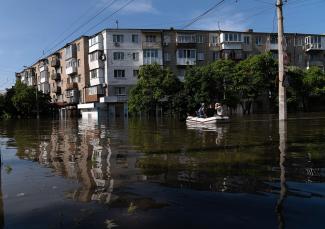Water as a Weapon

We don’t yet know what caused the destruction of Ukraine’s Nova Kakhovka Dam last week, causing widespread flooding across the southern portion of the country. But foul play seems highly likely: the New York Times reported expert assessments that a deliberate, internal blast caused the dam to fail. If so, Nova Kakhovka will join the long and tragic history of warring parties using water as a weapon. Doing so is a notably brutal act. Causing deliberate flooding rarely changes the course of a conflict – but it does cause widespread death and destruction, especially among civilians. That is why using water as a weapon should be banned under international law.
Deliberately causing floods to harm or delay ones’ enemies, sometimes known as “hydraulic warfare,” has been practiced for centuries, if not longer. It was used by both sides during the Second World War, including by the British, whose storied 1942 air raid on Germany’s Ruhr dams caused some 1,300 deaths from flooding while doing little to harm German war production. The largest-scale and most destructive use of water as a weapon in modern history, though, occurred in China. In 1938, Chinese Nationalist forces deliberately breached levees along the Yellow River in order to halt the advancing Japanese army. According to some accounts, it worked—but at the cost of hundreds of thousands of civilian lives.
The tragic history of using water as a weapon holds three main lessons for today. First, it rarely has a decisive impact on the course of a conflict. The extensive use of hydraulic warfare during World War Two caused mostly minor damage and delay to military forces. Second, and on the other hand, the brunt of death and destruction caused by deliberate flooding has almost always been borne by civilians. Third and finally, the worst effects of deliberate flooding occur after the initial release of water. In the aftermath of a major flood, crops become damaged, drinking water is often contaminated, critical infrastructure is destroyed, and disease frequently runs rampant. All these second-order effects of flooding can dramatically increase the death toll.
Unfortunately, each of these lessons of past uses of water as a weapon appear to be holding true in the case of Ukraine. According to Ukrainian government sources, 1,400 people were forced to flee in the immediate aftermath of the dam breach, and tens of thousands of people were affected. United Nations reports, meanwhile, note the sadly familiar risk of contamination to land and water caused by oil and pollution sources being mixed with flood waters – along with the additional risk of landmines being uprooted and swept downstream. The Zaporizhzhia nuclear plant, Europe’s largest, was also shut down in direct response to the flood.
No matter who or what is eventually determined to have caused the destruction of the Nova Kakhovka Dam, or what impact it has on Russia’s conflict with Ukraine, the incident highlights both the importance and the challenges of preventing the use of water as a weapon. Ukrainian President Volodymyr Zelensky called the flood “an environmental bomb of mass destruction,” and announced his government was initiating a war crimes investigation amidst allegations that Russia was responsible. In doing so, he echoed previous allegations that Russia was perpetrating “ecocide” against Ukraine. Yet even if Russia was responsible for breaching the Nova Kakhovka Dam, and even if it did so deliberately, it is not clear it broke international law.
As a practical matter, international law does not categorically prohibit the sort of hydraulic warfare that Zelensky argues Russia is practicing against Ukraine. The Additional Protocol to the Geneva Convention, the primary international law instrument that applies in times of war and conflict, and to which Russia and Ukraine are signatories, prohibits “methods or means of warfare which are intended, or may be expected, to cause widespread, long-term, and severe damage to the natural environment.” However, international law also generally recognizes that infrastructure such as dams may be legitimate military targets, at least under certain circumstances. This means that it is far from clear that, if the Nova Kakhovka Dam was destroyed deliberately, justice can or will be served under international law.
Going forward, international law should be clarified to categorically prohibit the deliberate destruction of critical infrastructure, such as dams, that primarily serve a peaceful purpose and disproportionately harm civilians. This can take the form of new international agreements and revision of existing ones. In parallel, world leaders should work to strengthen norms against using water as a weapon. Mechanisms like the Global High Level Panel on Water and Peace can serve important roles in this effort. Water should never be used as a weapon, and the best way to honor those impacted by Nova Kakhovka is to ensure the end of hydraulic warfare.
- Flood Risk Stormwater Management
- Community Capacity Building & Water Equity

